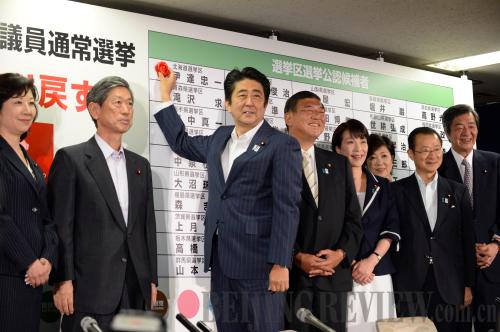|
 |
|
THE ONE LAUGHS TO THE LAST: Shinzo Abe, Japanese Prime Minister and President of the Liberal Democratic Party, attaches a red paper rose to a candidate's name to indicate an election victory at the party's headquarters in Tokyo on July 21 (MA PING) |
Peace, power, and politics—the three forces make for a delicate balance.
Japanese Prime Minister Shinzo Abe put an exclamation point on his political comeback since resigning from the post in September 2007, leading his party to a landslide victory in Japan's upper house elections on July 22. As the ruling coalition took a majority in both houses, Abe will become the most powerful Japanese prime minister in the last six years. But whether his newfound power will be used to raise Japan out of its economic recession or to lash out against its neighbors has yet to be determined.
Triumph
After running through seven prime ministers in the past seven years, Japan is set to end the string of power shifts—for now, at least. Japan's ruling coalition, the Liberal Democratic Party (LDP) and the New Komeito Party, won 76 of the 121 seats up for grabs in the upper house election. Along with the uncontested 59, the ruling bloc has a total of 135 seats in the 242-seat chamber. The ruling camp also holds an overwhelming majority in the more powerful lower house. The elections put an end to the so-called "twisted parliament" and cemented a solid base for Abe's long-term administrative goals. With the ruling coalition's overwhelming majorities in parliament, Abe is unlikely to face another election until 2016. Chinese observers credited the election results to voters' hopes for an economic recovery.
Wang Taiping, a research fellow with the China Institute of International Studies, said voters turned out to support the LDP in the upper house elections after a poor performance by the Democratic Party of Japan on domestic and diplomatic affairs during its ruling term from 2009 to 2012. Moreover, Abe has pressed hard on territorial disputes with China to win right-wing and conservative voters. Wang noted that Abe had been campaigning on an economic revival plan known as "Abenomics," which rapidly gained the support of voters.
Abenomics is essentially made up of "three arrows": pressuring the Bank of Japan to launch unprecedented monetary easing and setting a target of 2 percent inflation to support a target of 2 percent real GDP growth (4 percent nominal growth); a deficit-financed supplemental government budget filled with new public works spending; and a host of reforms to achieve growth through stimulating private investment.
The ruling coalition's victory can be traced to before the elections, as the Abe administration's approval rating reached a record high of 60 percent, said Zhang Hong, a researcher with the University of International Business and Economics in Beijing. She added that after seven years of revolving-door-like power shifts between a series of prime ministers, Japanese voters are desperate for a lasting and powerful government.
Liu Rui, a researcher on Japanese economic studies with the Chinese Academy of Social Sciences (CASS), noted the impact of the LDP's message to voters during the election campaign: Abenomics, the party said, aims to stimulate the economy and combat long-term inflation. He said the first two "arrows" can stimulate consumption and investment quickly by spurring demand. Though they fall short of promoting long-term growth, they win time for Abenomics' third policy tool—the economic growth strategy, said Liu. With Abenomics' impact on market confidence and public support, the LDP gains at least three years for the Abe administration to implement the full economic stimulus package.
Wu Huaizhong, a Japanese political studies researcher with the CASS, claimed the election results cemented the country's rightward trend, providing a relatively stable political basis for the Abe administration to implement its conservative policies. "Abe has a historic opportunity to realize Japan's political and economic revival and adopt aggressive domestic and diplomatic policies," Wu said. "The success or failure of these policies will greatly influence Japan, the greater region and even international society."
|
